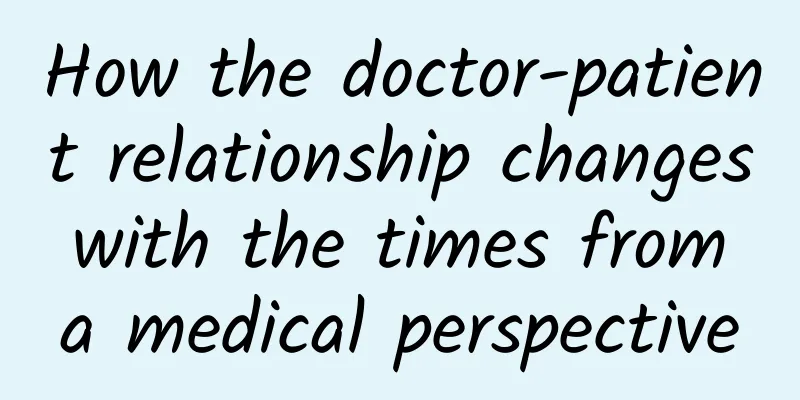How the doctor-patient relationship changes with the times from a medical perspective

|
This is the 3824th article of Da Yi Xiao Hu Since the beginning of the year, I have been carefully studying the book "Group Medicine" translated by Academician Wang Chen, and I was deeply shocked. Just a few days ago, I had the honor to read the article "Doctor-patient relationship should change with the times, how should it change?" written by Professor Yuan Jie, which was published on the public account "Da Yi Xiao Hu". I also benefited a lot from it, so I came up with the idea of writing a reading experience from the perspective of group medicine to respond to Professor Yuan Jie. At the beginning of the article, Professor Yuan Jie pointed out that due to the ever-changing social and historical background, the doctor-patient relationship has also been evolving and developing. In ancient times, the doctor-patient relationship was simple, and everything from obtaining the condition, making a diagnosis to implementing the treatment was done directly by a doctor. The doctor was fully responsible for the patient, and the patient completely entrusted his health and life to the doctor. With the development of modern medicine and industrial society, the simple doctor-patient relationship has changed. At present, in the medical service system of most countries in the world, the required medical resources are paid by the whole people, and patients are striving to ensure that patients will no longer be unable to obtain medical treatment because they cannot afford the medical expenses. The people who pay for these medical services include not only patients who have already used medical and health care and patients who are sick but have not used the resources, but also people who are healthy now and may never suffer from this disease. The responsibilities of doctors have also changed accordingly, not only including wholeheartedly treating every patient they see, but also assuming the responsibility of medical resource managers, so that all people with medical needs (but who cannot come to the clinic for face-to-face consultation) can make good use of medical resources, and at the same time be responsible for the entire population. Therefore, the relationship between doctors and patients requires changes accordingly. In past medical practices, healthcare managers and clinicians have been committed to improving the quality of medical care. Although focusing on improving the quality of medical care can increase value, it cannot maximize value. Although there is strong evidence that a certain intervention has more benefits than disadvantages, it may not be of high value to a certain group or individual. This is because the value of an intervention depends on the environment in which it is implemented, and the environment determines whether the intervention is appropriate. The evaluation of the effectiveness of an intervention is objective, while the evaluation of the appropriateness of an intervention is subjective. In healthcare, value is measured by the relationship between outcomes and costs, using the following formula: Value = Outcome / Cost Since any medical measure has its pros and cons, the formula is modified: Value = (good ending - bad ending) / cost Although high-quality medical and health care, evidence-based decision-making, and patient safety are still important, the 21st century has entered an era where health outcomes dominate values. Patients' views on outcomes are increasingly valued, and we should not only measure how much care patients receive from medical staff, but also examine their views and opinions on medical and health care outcomes. In the past 20th century, people saw more benefits brought by the development of medical technology, but in the 21st century, the main focus for both patients and the public is the balance between benefits and disadvantages. Therefore, in the process of medical decision-making, patients' preference-sensitive decisions must be respected, that is, the trade-off between benefits and disadvantages should be made by patients in an informed manner. For example, when male patients choose prostate cancer treatment options, they need to consider whether avoiding incontinence or sexual dysfunction is more important to them. They need to get full support from medical staff and patients to participate together - "doctors and patients work together" to reduce and avoid "silent misdiagnosis". The so-called "silent misdiagnosis" means that even when the disease is accurately diagnosed, clinicians still fail to understand the patient's personal preference for treatment selection and choose interventions that are contrary to the patient's values. In the 20th century, medical professionals always provided medical and health care services based on the concept of "the more the better". However, in the 21st century, a new paradigm has emerged - the "three do's" of health services - what can be done, what is actually done, and what should be done. With the aging population and the surge in “can dos” caused by the development of medical technology, the increase in medical service capacity and costs in the future will be an imminent “tragedy of the commons”. The biggest challenge we face is not to expand “can dos”, but to take “should dos” as the principle. Otherwise, our medical and health system will collapse either financially or morally. Author: Wang Hailong, attending physician, Hematology Hospital, Chinese Academy of Medical Sciences |
<<: Approaching Breast Hyperplasia
>>: Do you get how to manage your home medicine cabinet?
Recommend
How is adenomyosis treated?
The uterus is an important organ for every woman....
What are the methods to promote ovulation?
With the rapid development of the economy, people...
What happens when menstruation comes again after the period ends?
Under normal circumstances, after a woman's m...
The main cause of female infertility is
It is recommended that both men and women should ...
When to add bamboo fungus to soup (add it three minutes before boiling for higher nutritional value)
...
What are the techniques for applying mascara?
Once, when I met a female friend, I was startled....
What to do if a woman's private parts are pink and tender
Many women have high demands on their bodies and ...
Uterine adhesion can be detected by color Doppler ultrasound
Intrauterine adhesion can be said to be a relativ...
How can women prevent breast shrinkage after childbirth?
The size of breasts sometimes affects a woman'...
Can malignant ovarian cysts be cured? Be sure to seek timely treatment!
Most ovarian cysts are benign and have not yet fo...
The harm of plastic smell to pregnant women
Plastic is everywhere in our lives, such as the p...
Is the high echo in the uterine cavity congestion?
It is very common for unmarried women to have abo...
What are the harms of sexless marriage to women?
Marriage life is a normal life pattern for people...
Is having a second baby less painful?
The pain level of childbirth is very high. If you...
What are the benefits of drinking pomegranate juice in autumn? How to squeeze pomegranate juice
Pomegranates can be eaten directly or squeezed in...









